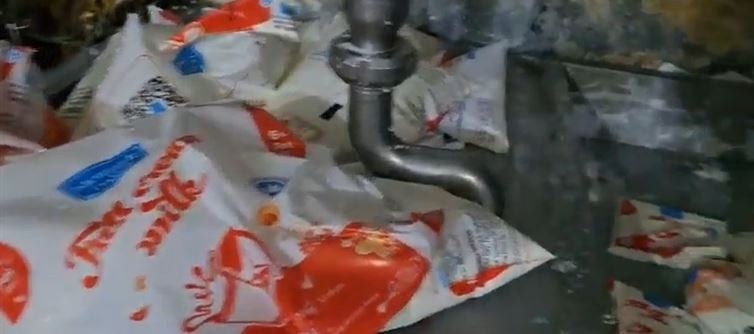
While you’re sipping your “fresh” buttermilk this summer, somewhere in Bulandshahr, mold was dripping off the walls of the very factory that made it.
Yes — this is the same unit that manufactures products for Mother Dairy, one of India’s most trusted brands.
The Food Safety Department’s recent raid didn’t just expose a dirty plant — it uncovered the rotting underbelly of India’s food chain, where expired salt becomes a raw material, fungus grows freely, and regulators look away until it’s too late.
🧫 1. The horror Scene: Mold, Decay, and Rot in a “Milk” Factory
Investigators walked into what looked like a crime scene — walls infested with mold, tainted pipes, and expired salt bags being mixed into buttermilk.
A place meant to process food looked like it could spread disease instead.
And yet, this was a licensed supplier producing for one of India’s biggest dairy brands.
⚠️ 2. Expired salt in buttermilk — The New “Recipe” for Profit
Expired salt — a basic ingredient — was being recycled and reused in bulk.
Why? Because cutting corners saves money.
In a country where profit outweighs ethics, expiry dates have become just decorative ink.
Each sip of that chaach is a chemical cocktail, disguised as “traditional refreshment.”
🧟 3. FSSAI — The Watchdog That Sleeps Through the Crime
The Food Safety and Standards Authority of india (FSSAI) was created to protect consumers, not corporations.
Yet every few weeks, raids like this expose the same truth — it’s the most complacent, compromised, and toothless regulator in the system.
If FSSAI did its job, india wouldn’t be eating detergent-laced milk, palm oil paneer, and fungus-flavored buttermilk.
💰 4. Corruption Has a Taste — and It’s Creamy, Branded, and “FSSAI Certified”
From fake ghee to adulterated paneer, the entire dairy sector is now a money-minting machine built on deception.
Factories that fail every hygiene test still run because money flows faster than accountability.
Consumers are being slowly poisoned under the halo of trusted brand names — and the irony? We’re paying premium prices for it.
⚖️ 5. When the Courts Go Soft, Crime Goes Viral
Every food crime should be treated like attempted murder.
Instead, most offenders get away with fines or a polite “warning.”
The judiciary’s leniency has made food adulteration a low-risk, high-profit business.
Until punishment becomes swift and severe, our plates will remain crime scenes.
🧩 6. The Chain of Shame — From Factory to Fridge
Let’s be clear: the blame doesn’t stop at one filthy unit.
It runs through every unchecked license, every paid-off inspector, and every government report buried in bureaucracy.
From the factory worker forced to reuse spoiled ingredients to the CEO who signs off “QC approved,” the entire chain is complicit.
🔥 7. The Common Man Always Pays — With Health, Not Just Money
In a country already battling protein deficiency and malnutrition, adulteration is slow violence.
The poor can’t afford branded products, and now even the branded ones can’t be trusted.
What hope does a common man have when milk — the symbol of purity — turns toxic?
💬 CONCLUSION:
If there’s mold in our food factories and silence in our courtrooms, then India’s food safety system is already dead.
What we need now isn’t another round of PR assurances — we need public outrage, legal overhaul, and life sentences for food criminals.
Because if justice doesn’t wake up soon, the next glass of buttermilk could be your slow poison.




 click and follow Indiaherald WhatsApp channel
click and follow Indiaherald WhatsApp channel